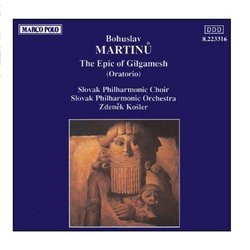| All Artists: Zdenek Kosler, Bohuslav Martinu, Slovak Philharmonic Orchestra, Ivan Kusnjer, Ludek Vele, Eva Depoltova, Stefan Margita, Slovak Philharmonic Choir Title: MARTINU: Epic of Gilgamesh (The) Members Wishing: 0 Total Copies: 0 Label: Marco-Polo Release Date: 7/27/2009 Genre: Classical Style: Opera & Classical Vocal Number of Discs: 1 SwapaCD Credits: 1 UPC: 730099331623 |
Search - Zdenek Kosler, Bohuslav Martinu, Slovak Philharmonic Orchestra :: MARTINU: Epic of Gilgamesh (The)
 | Zdenek Kosler, Bohuslav Martinu, Slovak Philharmonic Orchestra MARTINU: Epic of Gilgamesh (The) Genre: Classical
|
Larger Image |
CD Details |
CD ReviewsFine Version of Great Choral Work - but get it on Naxos! Nicholas A. Deutsch | New York, NY USA | 06/12/2004 (5 out of 5 stars) ""The Epic of Gilgamesh" (1954-55) is a magnificent piece for 4 soloists, chorus and orchestra, one of the "undiscovered masterpieces" of 20th century choral music. The score shows Martinu at the height of his mature powers, responding at every turn to his chosen text - excerpts from the ancient Babylonian tale of the hero Gilgamesh and his friend Enkidu - with music of tremendous power, imagination and directness.
Martinu set an English translation by R. Campbell Thompson, written in deliberately "archaic" language which emphasizes its mystery and distance from the present day; the composer even preserved places where the text trails off in mid-sentence, indicating a gap in the surviving tablets. Part One starts with a text in praise of Gilgamesh, then tells how the primitive innocent, Enkidu, is seduced by a courtesan, thus severing his natural connection with his animal companions, and how Enkidu comes to the city and engages Gilgamesh in one-on-one combat. Part Two tells of the death of Enkidu - now Gilgamesh's beloved friend - and Part Three of Gilgamesh's search for immortality, and his questioning of Enkidu, raised from the earth at Gilgamesh's request by his father, the Moon God Enlil. These episodes are shrewdly chosen to give Martinu a chance to write a wide range of music, all orchestrated with this composer's customary brilliance: from the warm pastoral idyll of Enkidu's initial life, through the sensuality of his seduction, to the violence of his duel with Gilgamesh; then the sober, compassionate contemplation of Enkidu's death, Gilgamesh's anguish at his loss and the discovery of his own mortality, to the truly otherworldly chill of Enkidu's return, with his unvarying answer to each of Gilgamesh's questions: "I saw, I saw..." This is one of many riveting passages in a score of uniformly high quality and interest. Both available recordings of "The Epic of Gilgamesh" are sung in the Czech translation by Ferdinand Pujman. Both are very good performances. This 1989 version on Marco Polo has in fact been reissued on Naxos, where it's not only cheaper but comes with significantly improved booklet materials, containing the full sung (Czech) text as well as the English version; Marco Polo has only the latter. Also worth considering is the slightly more expensive Supraphon version, in luxurious 1976 analog sound. I can't really recommend one over the other - each one reveals different aspects of a rich work - but I do recommend that you give "The Epic of Gilgamesh" a try." |

 Track Listings (29) - Disc #1
Track Listings (29) - Disc #1